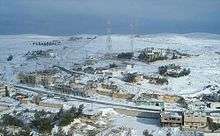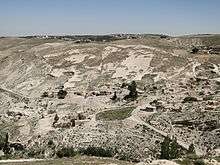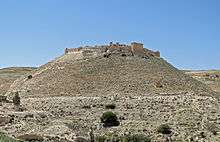Shoubak
| Shoubak مدينة الشوبك | |
|---|---|
| Town | |
 | |
 Shoubak | |
| Coordinates: 30°31′53″N 35°33′39″E / 30.53139°N 35.56083°ECoordinates: 30°31′53″N 35°33′39″E / 30.53139°N 35.56083°E | |
| Country | Jordan |
| Province | Ma'an Governorate |
| Municipality established | 2001 |
| Government | |
| • Type | Municipality |
| • Mayor | Abdul Rahman Turah |
| Area | |
| • Metro | 15 km2 (6 sq mi) |
| Elevation[1] | 1,330 m (4,360 ft) |
| Population (2004)[1][2] | |
| • Town | 12,500 |
| Time zone | GMT +2 |
| • Summer (DST) | +3 (UTC) |
| Area code(s) | +(962)3 |
| Website | http://shoubak.gov.jo |
Shoubak (Arabic: الشوبك) is a municipality that lies at the northwestern edge of the Ma'an Governorate in Jordan. It has a population of 12,500. At one of the highest elevations above sea level in Jordan, this municipality is famous for apple and fruit farms. The Crusader castle Montreal is located in Shoubak.
History
Shoubak was first settled by the Edomites who had their capital in Busaira in neighboring Tafilah Governorate. It was then settled by the Nabataeans.
Shoubak became a Nahia in 1894, and was administratively belonging to the then-Ottoman Kerak department. In 1973, it was ranked up to a Qadaa. In the 31st Administrative Divisions System of 1995, Shoubak became a full department within Ma'an Governorate benefiting from the decentralization program.
Shoubak is known for its Crusader castle Montreal. Along with Petra and Aqaba, Shoubak forms the third head of this triangle that lies on the cross road between Syria, Saudi Arabia and Egypt. Its unique high elevation (1330 m above sea level) gave it a strategic importance.
The importance of Shoubak reached its peak after Baldwin I of Jerusalem took control of it, cutting the roots between Egypt and Syria, the Montreal castle was built on top of a hill there in 1115. Shoubak was then annexed to the Ayyubid dynasty by Saladin in 1187.
Geography and climate

Shoubak is located at an area bordering Tafilah Governorate to the north and Aqaba Governorate to the west. It is administratively in Ma'an Governorate. Due to its high elevation, Shoubak is famous for its cold freezing winters, and due to its location at the borders of the Arabian Desert, it has a dry summer season. The average annual rainfall in Shoubak is in the range 150-350 mm.
Demographics
The national census of the year 2004 showed that the total population of Shoubak was 12,590 persons, of whom 5,666 are males (45%) and 6924 are females, constituting 55% of the total population. There were 1,663 households with an average of 5 persons/household. Almost the entire population are Muslims.[3]
Economy

Agriculture forms the major source of income for Shoubak, followed by tourism. Benefiting from its high altitude of more than 1,300 m above sea level, the countryside of Shoubak extends to about 189 km2 of olive, vegetable and fruit farms, mainly apple farms surrounding and within the town of Shoubak, resulting in the city spanning a relatively large area. There are 129 honey bee farms in the town's countryside, making it a major producer of honey.[4]
Education
The college of agriculture of Al-Balqa` Applied University is located in Shoubak. The Regional Center of Agricultural Research and Technology Transport is also located in Shoubak.
Notable people
- Eid Dahiyat, incumbent Minister of Education
- Taha Ali Al-Habahbeh, Minister of State
